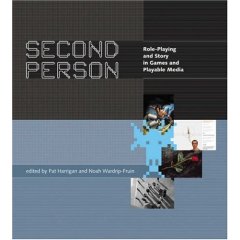My new year’s poem for 2008 was a computer program, a very short Perl program that generates poems without recourse to any external dictionary, word list, or other data file. I call it ppg256-1: “ppg” because it’s a Perl poetry generator, “256” for the length of the program in characters, and “-1” in the hopes that I will refine the program further and produce other versions. It was an attempt to drive process intensity up, keep program size down, and uncover what the essential elements of a poetry generator are.
To run ppg256-1, you can paste this onto your command line in Linux, Unix, Mac OS X, or (if you have Perl installed) Windows:
perl -le'sub w{substr("cococacamamadebapabohamolaburatamihopodito",2*int(rand 21),2).substr("estsnslldsckregspsstedbsnelengkemsattewsntarshnknd",2*int(rand 25),2)}{$l=rand 9;print "\n\nthe ".w."\n";{print w." ".substr("atonof",rand 5,2)." ".w;redo if $l-->0;}redo;}'
I found the process of developing this program very useful for my own thinking about computation and language. I’ll explain a bit about what that process was, in the hopes that I can communicate some of what I learned from it and to encourage you, if you’re interested in creative computation, to write short programs to explore the forms and ideas that you find most compelling.
This is a preview of
A 256-Character Program to Generate Poems
.
Read the full post.




